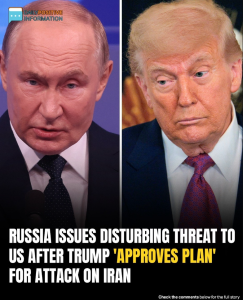Russia Warns U.S. of ‘Catastrophic’ Consequences If Trump Approves Strike on Iran: Global Tensions Hit Boiling Point
In a stark and chilling warning, the Russian Federation has officially cautioned the United States against launching any military strike on Iran, stating that such an action would trigger “catastrophic consequences” not only for the Middle East but for the entire world. The statement came just hours after reports surfaced that President Donald Trump, in his second term, is actively weighing a military response to alleged Iranian aggression in the Strait of Hormuz and other key flashpoints.
The Russian Ministry of Foreign Affairs released a fiery communique late Friday night, calling any American attack on Iran a “red line” and vowing that Moscow “will not remain passive” should such hostilities unfold.
“Any unilateral military action by the United States against the sovereign territory of the Islamic Republic of Iran will be viewed as a threat to regional stability and global peace. The consequences will be catastrophic,” said Russian Foreign Minister Sergey Lavrov during an emergency press conference in Moscow.
Tensions Reach New Heights
The tension began escalating earlier this week when an American surveillance drone was reportedly shot down near Iranian airspace. According to Pentagon sources, this was the latest in a string of provocations attributed to Iran, including attacks on oil tankers, cyber interference, and proxy activity via Shiite militias in Iraq and Syria. President Trump, speaking to reporters outside the White House, did not mince words.
“Iran is playing with fire,” Trump said. “We’re not looking for war, but we will respond decisively to any threat against American lives or interests.”
Though no official order has been given, defense officials confirmed that various strike options have been presented to the President, including targeted airstrikes on Iranian missile sites, naval facilities, and Revolutionary Guard bases.
Russia’s Role and Strategic Interests
Russia and Iran have been longtime strategic partners, particularly in Syria, where they’ve coordinated efforts to bolster the Assad regime. Moscow sees Iran not just as a military ally but as a counterbalance to Western influence in the Middle East. A U.S. strike on Tehran would not only threaten Russian geopolitical interests but could directly endanger Russian personnel and assets in the region.
Military analysts believe Moscow is drawing a line in the sand — not necessarily committing to direct confrontation with the U.S., but strongly signaling that it could retaliate through cyber means, weapons support, or indirect military engagement through proxies.
“This is a warning not just for the United States but for NATO as a whole,” said Colonel Andrei Ivanovich, a retired Russian military strategist. “Any destabilization of Iran will open the gates to chaos. And chaos benefits no one — except terrorists.”
The Global Response: Allies, Critics, and Panic
Following the Russian statement, European allies rushed to de-escalate the crisis. The United Kingdom, France, and Germany issued a joint appeal calling for “maximum restraint” and warning that military action would “risk triggering a wider regional war.” China also expressed concern, urging dialogue and diplomacy.
Israeli Prime Minister Benjamin Netanyahu, however, voiced strong support for Trump’s firm stance, stating that “Iran must be stopped at all costs before it becomes an existential threat to the entire region.”
In the meantime, global markets responded with panic. Crude oil prices spiked nearly 12% overnight, while the Dow Jones Industrial Average plunged 800 points on fears of a broader conflict. Middle Eastern airlines announced route changes to avoid Iranian airspace, and embassies across the Gulf issued travel warnings to American citizens.
What Is Trump’s Endgame?
Inside the U.S., opinions are sharply divided. Hawks within Trump’s administration — including national security advisor Richard Grenell and Secretary of State Mike Pompeo — are said to be urging a show of force to reestablish American deterrence. Meanwhile, some Pentagon officials are reportedly urging caution, worried about a potential quagmire similar to the Iraq War.
“We must hit them, and we must hit them hard,” Senator Lindsey Graham said on Fox News. “Iran needs to understand that we’re not playing games.”
But not everyone is in agreement.
“A strike on Iran could set off a chain reaction that leads to World War III,” warned Senator Bernie Sanders. “The American people do not want another endless war in the Middle East.”
President Trump has long criticized previous administrations for getting involved in prolonged foreign conflicts, which makes his current position particularly significant. Some insiders say the President feels cornered — accused of being “soft” on national defense while trying to maintain his campaign promise to avoid new wars.
Iran Responds: “We Are Not Afghanistan or Iraq”
Tehran, for its part, has responded with both bravado and threat. Iranian President Ebrahim Raisi warned that any U.S. attack would be met with “swift and fiery retaliation,” including strikes on American bases in the Gulf and on Israel.
“Let the world know: We are not Afghanistan or Iraq,” Raisi said in a televised address. “Our people are prepared to defend our homeland to the last breath.”
He also vowed that the Strait of Hormuz — through which nearly 30% of the world’s oil flows — would be closed indefinitely if Iran were attacked, a move that would likely send global energy prices into freefall.
Could This Spark World War III?
Experts warn that this moment is perhaps the closest the world has come to a global military escalation since the height of the Cold War. With Russia, the U.S., Iran, and Israel all playing dangerous hands on the same regional chessboard, one misstep — one missile too far, one wrong assumption — could ignite a regional or even global conflagration.
“This is not just a geopolitical crisis. This is a test of humanity’s ability to avoid repeating the worst mistakes of the 20th century,” said Dr. Farid Mahmoudi, a Middle East historian. “The road to peace is still open. But it’s narrowing quickly.”
Conclusion: A Fragile World on the Brink
As President Trump continues consultations with military leaders, allies, and intelligence officials, the world holds its breath. One decision — to strike or not to strike — could determine the course of history. With Russia standing firmly in Iran’s corner and America staring down another potential foreign entanglement, the stakes have never been higher.

